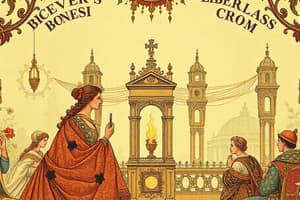Podcast
Questions and Answers
What distinguishes classical liberalism from social liberalism?
What distinguishes classical liberalism from social liberalism?
Classical liberalism emphasizes individual liberty and limited government intervention, while social liberalism advocates for government involvement to address social issues and promote equality.
How does modern liberalism differ from classical liberalism?
How does modern liberalism differ from classical liberalism?
Modern liberalism typically supports a larger role for government in addressing social and economic inequalities, whereas classical liberalism focuses on minimal government intervention.
What are some common criticisms of liberalism?
What are some common criticisms of liberalism?
Critics argue that liberalism can lead to excessive individualism, economic inequality, inadequate protections for marginalized groups, and bureaucratic inefficiencies.
What is the primary focus of libertarianism within the liberalism framework?
What is the primary focus of libertarianism within the liberalism framework?
What challenges can arise from the interpretation of rights and liberties in liberalism?
What challenges can arise from the interpretation of rights and liberties in liberalism?
What are the core values of liberalism?
What are the core values of liberalism?
How did classical liberalism differ from social liberalism?
How did classical liberalism differ from social liberalism?
Who were two key thinkers associated with classical liberalism?
Who were two key thinkers associated with classical liberalism?
What role does individualism play in liberal thought?
What role does individualism play in liberal thought?
What is meant by 'limited government' in the context of liberalism?
What is meant by 'limited government' in the context of liberalism?
How does liberalism promote equality?
How does liberalism promote equality?
What is the significance of the rule of law in liberalism?
What is the significance of the rule of law in liberalism?
In what way does liberalism value toleration?
In what way does liberalism value toleration?
Flashcards
Liberalism
Liberalism
A political philosophy prioritizing individual rights, freedoms, and limited government, emphasizing autonomy, equality, and democratic participation.
Individualism
Individualism
A core value of liberalism, recognizing the inherent worth and self-determination of each individual.
Freedom
Freedom
A key principle of liberalism, allowing individuals to act freely in various spheres, subject to reasonable constraints to protect others.
Equality
Equality
Signup and view all the flashcards
Limited Government
Limited Government
Signup and view all the flashcards
Rule of Law
Rule of Law
Signup and view all the flashcards
Toleration and Respect
Toleration and Respect
Signup and view all the flashcards
Rationality
Rationality
Signup and view all the flashcards
Classical liberalism
Classical liberalism
Signup and view all the flashcards
Social liberalism
Social liberalism
Signup and view all the flashcards
Modern liberalism
Modern liberalism
Signup and view all the flashcards
Libertarianism
Libertarianism
Signup and view all the flashcards
Criticism of liberalism: Excessive individualism
Criticism of liberalism: Excessive individualism
Signup and view all the flashcards
Study Notes
Core tenets of liberalism
- Liberalism is a political philosophy emphasizing individual rights, freedoms, and limited government.
- It champions liberty, equality, and popular sovereignty, advocating for individual autonomy and a democratic system.
- Core values often include freedom of speech, press, assembly, religion, and conscience, alongside the right to own property.
- It typically supports democratic institutions and processes, emphasizing civil liberties and the rule of law.
Historical evolution of liberalism
- Classical liberalism, emerging in the 18th and 19th centuries, emphasized individual rights and limited government intervention in the economy.
- Thinkers like John Locke and Adam Smith provided foundational ideas for this philosophy.
- Later, social liberalism developed, advocating for a greater role for government in addressing social issues and promoting equality of opportunity.
- This newer iteration addressed concerns about poverty, inequality, and discrimination, going beyond strictly economic issues.
- Contemporary liberalism encompasses diverse perspectives and focuses on social justice, equality, and government regulation to address societal problems.
Key aspects of liberal thought
- Individualism: Liberalism places high value on individual autonomy and self-determination. It emphasizes individual rights and responsibilities.
- Freedom: Liberalism prioritizes individual freedom in various spheres, including political, economic, and social life. This often includes freedom of thought, expression, and action, subject to reasonable constraints to protect others' rights.
- Equality: Liberalism generally advocates for equality before the law and equal opportunity. This does not necessarily equate to identical outcomes, but emphasizes fair treatment and access to resources.
- Limited government: A key principle is limiting government power to protect individual rights and freedoms. This often involves checks and balances and separation of powers within the government structure.
- Rule of law: Liberalism values a system of laws applied equally to all, ensuring fairness and predictability in social interactions and resolving conflicts.
- Toleration: Liberalism promotes tolerance and respect for diverse viewpoints, beliefs, and lifestyles, even those differing from one's own.
- Rationality: It often relies on reason and evidence-based decision-making to address political and social challenges.
Different types of liberalism
- Classical liberalism: Emphasizes individual liberty and limited government intervention in the economy.
- Social liberalism: Advocates for government involvement to address social issues and promote equality of opportunity. This often includes social welfare programs and regulations.
- Modern liberalism: A contemporary form of liberalism that typically embraces a larger role for government in addressing social and economic inequalities. Emphasis is often placed on social justice and civil rights.
- Libertarianism: A subset of liberalism emphasizing individual liberty and minimal government intervention in all aspects of life.
Criticisms of liberalism
- Some critics argue that liberalism can lead to excessive individualism and neglect the needs of the community.
- Concerns about potential for economic inequality and social stratification also exist.
- Critics sometimes find that liberalism can lead to inadequate protections for marginalized groups.
- There can be concerns about bureaucracy and the inefficiencies associated with extensive government involvement.
- The complex interpretation and application of rights, liberties, and equality can create difficulties in practice, particularly in complex societal situations.
Studying That Suits You
Use AI to generate personalized quizzes and flashcards to suit your learning preferences.




